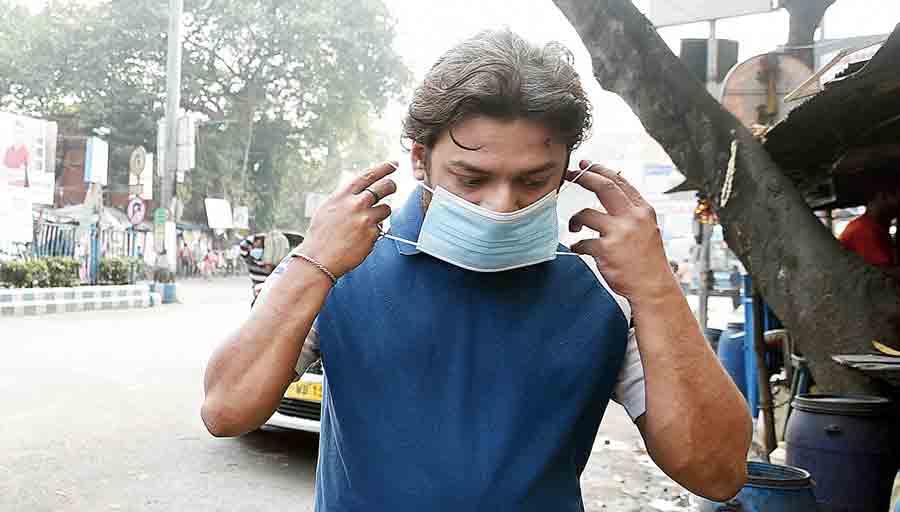Masks should be used as a part of a comprehensive strategy of measures to suppress transmissions and save lives. However, social distancing, hand sanitisation, avoiding crowded places and vaccination are also essential to fight Covid-19.
Masks are far better than no masks to reduce transmission. Avoidance of physical - and switch to, for instance, namaste - needs more acceptance today. Handshaking, elbow touching or kissing to greet an individual involve physical contact and are best avoided during this pandemic.
Adaptation to a Covid lifestyle is essential today and face masks are mandatory.
Mask culture
The role of wearing masks is best understood in the eastern Asia, in countries like Japan. Japanese society has accepted masks not only for medical reasons but also as a norm. There is a social pressure to wear masks for religious reasons, too. Even during the Meiji period (1868-1912), a lot of people were found to have their mouths covered.
It is stated that in the spring of 1918, Sumo wrestlers returned from a tournament in Taiwan with Spanish flu, which caused 50 million deaths globally. Wearing masks in Japan was further reinforced during that period not only to protect self but others as well. From 1980 onwards, pollen allergies became common nationwide, and masks again got its due importance.
The concept of a bow to greet individuals at a distance, avoiding physical contact, in Japan needs to be appreciated today. Along with masks, bowing goes a long way to prevent respiratory viral infections at all times.
Types
Various types of masks are now easily available in the market for direct use. However, the value of a particular mask needs to be adequately understood. Masks are most useful if people are within 6 feet of each other. It can prevent transmission of various types of respiratory pathogens.
Cloth masks are commonly used, although it offers minimum protection when used alone. It can provide a style statement, though it's use along with surgical masks are more welcome.
Surgical or procedure masks are approved to provide much more protection. It can prevent large droplet particles but should fit well. It usually has multiple layers.
Respirators like N95 or KN95 provide the most protection and are mainly used by medical personnel. It can filter both large and small droplets and is the safest.
Masks should be clean before use and must cover the nose and mouth adequately. While taking off a mask, it should be transferred to a clean bag as the outer surface can harbour infection. Valves are not permitted in masks as it does not filter air as the person breathes out.
It is true that no mask can provide complete protection, but all masks are not equally effective. It is best to use the more effective one.
Misconceptions
• Carbon dioxide retention is not significant in cloth or surgical masks. It can happen with respirators not with intermittent use but with prolonged usage by medical personnel which needs to be taken care of.
• Masks can be worn in various chronic lung conditions with consultation of a physician.
• All masks lower the incidence of Covid-19 but should be properly fitted.
• Masks are welcome in all situations, though beyond 6 feet or in fully vaccinated individuals it may not be that important.
• Face shields alone do not offer protection without masks.
• Masks differ in quality, wearing two masks is an option.
Beneficiaries
Though masks have been in use for the past two years, there seems to be a reluctance to wear them worldwide. This is totally unacceptable.
However, there are some people who have benefited by wearing masks. Those who have any facial paralysis or deformities seem more comfortable in this situation. Patients having oral cancers who have undergone major head and neck surgeries, or have radiotherapy-related complications prefer to wear a mask.
In such situations it is not always the physical deformities that is of concern but the unnecessary emotionless queries that are worrisome. There are many people who enquire just to satisfy their inquisitive nature without being of any help whatsoever. There are also people who are not keen to be identified for personal or professional reasons and are very comfortable with masks.
Adaptation
There is no doubt that Covid is here to stay, not necessarily in a widespread pandemic or epidemic form but in a more localised endemic state.
Giving up in a hostile situation is not an option, rather proper adaptation is the key to success. Post-Covid clinics for short and long rehabilitation are necessary. A new normalcy is here, let us accept it.
Time has come to adapt, mask up India.
Gautam Mukhopadhyay is secretary of the Bengal Oncology Foundation and clinical director of the department of surgical oncology, Peerless Hospital
